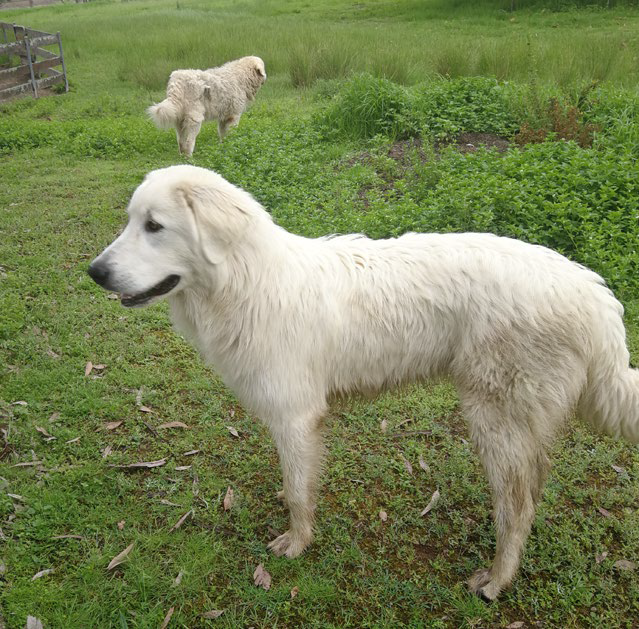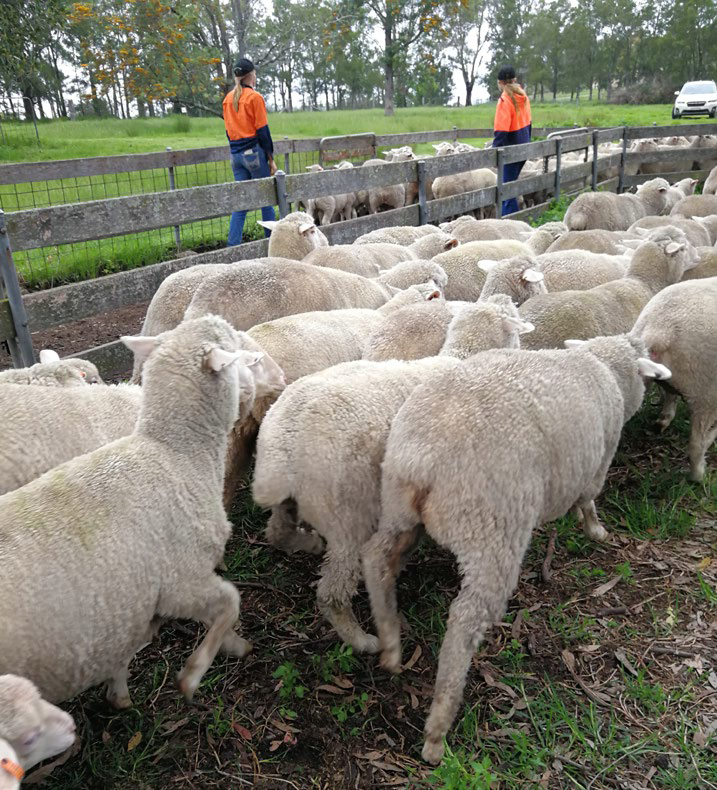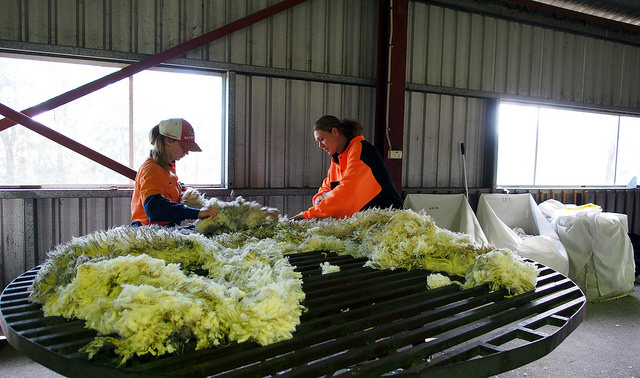Fast Facts
Property name - Bona Vista
Purchased - 1974
Area - 113 hectares
Herd (March 2020);
| Ewes - Breeders | 200 |
| Ewes - Hoggets | 50 |
| Lambs/weaners | 240 |
| Rams | 3 |
| TOTAL Sheep | 493 |
Wool Production - Over 1 tonne per year
Prime lambs/year - 80 - 150
Tocal established a self-replacing Dohne flock in 2008. These sheep gradually replaced a 1st cross breeding enterprise that had been run for a long period of time. The new Dohnes were run side by side for comparison for 5 years until we were able to breed up to a sustainable number of Dohne breeders. The Dohne sheep are equal to the 1st X lambing percentages, management costs and ewes dollar for dollar returns on sales. The breeding of ewe lambs is where the Dohnes have excelled, saving Tocal $20,000 to $25,000 every 6 years for replacement 1st X ewes.
A Maremma dog was introduced to the flock in 1997 following several dog attacks during lambing. Feral dog control is a key management area that is focussed on to eliminate losses of lambs and other young stock. There is no Maremma currently running with the sheep.
For several years Tocal had been in a flock-building period, keeping the bulk of ewe lambs on as breeders. In 2015 management moved into a consolidation culling program. Using Stockbook data, ewes are culled on fleece weight, micron, fleece visual traits, lambing, lamb survival and conformation.
We now keep our flock at 200 ewe breeders and 50 ewe hoggets and 25 lambs for student farm butchery training.
For more images taken on the Tocal farms go to our Tocal Farms Flickr album https://www.flickr.com/photos/tocalcollege/albums/72157664513318258
For videos about the Tocal farms go to our YouTube channel (NSW SPI Schools Program) https://www.youtube.com/playlist?list=PLCw_zxSFv4qdluVIhRWpM6R39KFqro5BA
Details
Size of the farm
Sheep are run on part of the 100ha farm known as Bona Vista. The flock at Tocal is managed along commercial lines although its size and the humid climate in this area is not ideal for profitable sheep production. The flock is grazed on both introduced and native pastures with some areas also irrigated in rotation with dairy heifers.
Herd size and composition
The flock of 200 breeding ewes is run for both meat and wool.
Age/size when sold
Lambs are sold from 16 weeks of age.
Markets
About 150 lambs are sold as stores for later meat production, 100 ewes culled for age
and type as well as 1,400kg of wool is produced each year.
Our annual shearing and wool classing is carried out by students. A wool classing course is run each year in our shearing shed by NSW TAFE.
Average price last year /kg /animal?
Over 2019 the sheep enterprise continued much as the previous year with very good prices for sheep and lambs and reasonable prices for wool.
Sales:
- 104 cull ewes at $150 per head for total of $13,940
- 2 Rams for $100 each and 132 lambs selling at $66 per head for total of $8,780
- Wool sales were also strong with 7 bales of sold for $11,965
- Total income of $34,906.
Supplementary feed
Cereal hay was purchased to feed the sheep during the worst of the drought in 2018/2019.
Where do you sell Tocal lambs?
Ewes were sold through the Dubbo sale yards and lambs were sold privately.
Describe the technology involved with the following
Pasture/ supplementary feed
Improved pasture is sown in two paddocks each year and supplementary feed is provided as needed.
Breeding
Stockbook data is recorded and ewes are selected for lambing, work and muscle performance.
Herd management
Rotational grazing principles employed as well as worm testing and vaccination for barbers pole worms and six-in-one for pulpy kidney, Black disease, Blackleg, Malignant oedema, tetanus and cheesy gland.
Describe the day to day management of the sheep farm
The sheep and wool enterprise remains one of the big contributors to student training at Tocal College with student participation in drenching, vaccination, animal handling skills, crutching and shearing. The sheep and lambs provide a safe opportunity for novice students to learn valuable practical skills.
What challenges do you face farming sheep on Tocal?
Tocal has a number of challenges to contend with including high rainfall, high humidity, low quality pasture, internal parasites, dingos and wild dogs. With well breed sheep persistent management we are able to keep the challenges under control.
The two major challenges for our sheep enterprise continue to be Barbers Pole worm and wild dogs. Constant monitoring, worm testing and drench choice has kept the worms under control.
As with all enterprises weather can have significant impacts on sheep and wool production. The drought conditions on Tocal favoured the sheep flock, we had high lambing percentages and the lambs were sold at higher weaning weight than normal. The ewes maintained excellent condition.
Wild dogs
Tocal is a large 2200 ha farm with large amounts of scrub and is bordered by hilly scrub, absentee farmers and a small town. This is the perfect environment for dingos, wild dogs and town dogs to attack domestic livestock in the area. Tocal runs a program of shooting, baiting and employing a sheep protection dog. Since the drought in 2000 close to 200 dogs have been shot, trapped or poisoned on bait stations.

Previous Marremma guard dogs, Jack and Dune-doo, wait while the sheep are in the yards.
Internal Parasites
Due to its location and high rainfall Tocal is the perfect environment for Barbers Pole worms (Haemonchus). As with most farms we have drench resistant strains of worms and we rotationally graze every three to four days to minimise the reinfection of the sheep in the paddocks they are grazing. We also rotate three drenches to reduce worm resistance to drench.
Rainfall
One of the greatest challenges to running sheep at Tocal is the high rainfall averages.
Tocal receives an average of 950 mm of rain each year. Together with high temperatures and high humidity, any sheep run at Tocal have to be of high quality
With high rainfall comes flooding and the sheep area can be inundated up 3 times a year. Of the 50ha area available for the Tocal sheep flock, 10 ha is high enough to never be flooded. During flooding and lambing the sheep are supplemented with home grown pasture silage.
Establishment of the Dohne flock
Traditionally Tocal has run 200 1st X ewes joined to Dorset rams and 100 merino wether wool cutters. These enterprises were highly productive but had low to medium educational value. Replacement ewes were replaced 200 at a time and all progeny sold or slaughtered for student training in farm butchery.
As part of the Tocal sheep training program, students visit top sheep enterprises around the north of NSW covering fine and superfine wool, SRS, wool testing, meat breeds, shedding sheep, Fletcher International sheep processors, enterprise ewe and ram selection and management.
On our tours we visited a number of Dohne enterprises and we were impressed with the dual-purpose improvement and production gains being achieved in a short time.
Wishing to continually improve our education experiences for our students we explored starting a self-replacing sheep flock. With production goals of high fertility, high meat and wool production we were drawn to the Dohne Breed.
With encouragement and support from Graham Coddington (Roseville Park Dohnes) Tocal purchased 50 in lamb maiden ewes in 2008. The ewes and a ram were selected by the students with guidance from Graham, the first of many new positive educational outcomes. The next year the students selected 50 cast for age 5- and 6- year-old ewes and two rams. The 100 Dohne ewes were then run with and compared to the remaining 100 XB ewes under the same conditions.
Dohne wether lambs and mixed sex prime lambs were sold for the same price over the hooks at a local meat works at 22kg dead. Cast ewes were sold at Tamworth and received the same returns for Dohne and XBs.
Lambing percentages were equivalent, however in 2015 lambing percentages were down due to running higher numbers and harsh weather conditions.
In money terms the per head returns were equal between Dohne and XBs over the five-year comparison.
In real terms the Dohnes were way ahead as a price was not put on the value of the self-replacing Dohne ewe lambs retained each year. (100 at $100/head $10,000) Being able to retain the ewe lambs saves Tocal $20,000 to $25,000 every 5 or 6 years as we do not need to purchase replacement 1st X ewes any more.
Wool statistics
| 2011 Fleece 19.9 mic | Cut 5.1kg av | Clean 1472 c/kg |
| 2012 Fleece 19.9 mic | Cut 4.2kg av | Clean 1061 c/kg |
| 2013 Fleece 19.3 mic | Cut 3.8 kg av | Clean 1260 c/kg |
| 2014 Fleece 19.4 mic | Cut 4.2 kg av | Clean 1231 c/kg |
| 2015 Fleece 19.5 mic | Cut 4.6 kg av | Clean 1342 c/kg |
| 2016 Fleece 19.3 mic | Cut 4.3 kg av | Clean 1492 c/kg |
| 2017 Fleece 19.3 mic | Cut 4.3 kg av |
Livestock sales
December 2019 sale store ewes sold for $150 average
Wether Lambs $70 average
January 2020 wether weaners 2 months after sale for $75 ea
Student input to farms
The sheep and wool enterprise is a big contributor to student training at Tocal College with student participation in drenching, vaccination, animal handling skills, crutching and shearing. The sheep and lambs provide one of the best ways for novice students to learn valuable animal handling skills.
Students are involved with Tocal farms at all stages of the management cycle. Certificate III students muster, draught, drench, vaccinate, milk and handle livestock as well as sowing pasture for stock as needed within the farm enterprises. Certificate IV are involved in feed lotting, breeding, crop establishment, sheep and cattle management activities.
Tocal students graduate as agriculturalists that have experienced work practices on the College farms, commercial work placement farms and prepares them to move forward into their working lives.
Across all the enterprises run at Tocal for the education of future agriculturalists is the overarching principle of experience. Experience through hands-on real time education and background knowledge gained in the classroom. A typical Tocal student will spend 50% of the course in the field.
All Certificate III students study the sheep industry and learning basic hands-on skills through lamb marking, drenching, vaccinating selection and culling for sale and general handling of sheep. Over half of the returning Certificate IV students study sheep management and breeding as an elective. Students are involved in shearing and crutching, wool classing, ram and ewe selection, joining observations, lambing and mothering activities.
The move on the sheep section to a self-replacing flock expanded opportunities for students to select replacement ewes, select and purchase rams, shearing and crutching, wool classing, sheep store sales, electronic tagging and information Tocal property and farms (2021 update) 86 recording, joining and lambing management.
The Certificate IV sheep electives are very popular due to the experiences and responsibilities the students leave with a sense of pride and accomplishment that come with working with the Tocal’s Dohne flock.

Tocal newsletter
Want to find out about news, events, courses and publications?

